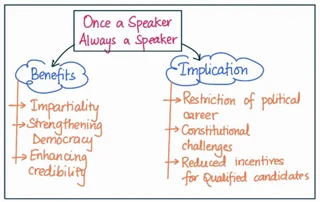Answer:
| Approach:
Introduction
- Explain the concept of “Once a Speaker, Always a Speaker” and its objective to impart objectivity to the office of the Speaker.
Body
- Discuss the potential benefits of adopting this practice.
- Examine the potential implications for the robust functioning of parliamentary business in India.
Conclusion
- Write a relevant conclusion.
|
Introduction:
The practice of “Once a Speaker, Always a Speaker” implies that the Speaker should not return to active party politics even after their term ends. This approach aims to impart objectivity and neutrality to the office of the Speaker.
Body:
However, it is essential to examine the potential implications of this practice for the robust functioning of parliamentary business in India:

Potential Benefits:
- Impartiality: Adopting this practice would reinforce the impartiality of the Speaker, as they would not be beholden to any political party during or after their term.
- Strengthening democracy: Ensuring the neutrality of the Speaker would contribute to a healthier democratic process by promoting fair debate and discussion in the house.
- Enhancing credibility: The perception of the Speaker as an unbiased figure would enhance the credibility of the office and boost public trust in the parliamentary process.
Potential Implications:
- Restriction of political career: The practice could be seen as a limitation on the political career of the individual serving as the Speaker, as they would not be able to return to active politics after their term.
- Reduced incentive for qualified candidates: The prospect of not being able to rejoin their party after their term might discourage qualified individuals from taking up the position of the Speaker.
- Detachment from political realities: A Speaker permanently detached from active politics might lose touch with the evolving political landscape, which could hinder their ability to effectively manage parliamentary proceedings.
- Constitutional challenges: Implementing such a practice might face constitutional challenges, as it could be perceived as an infringement on the individual’s right to participate in political activities.
Conclusion:
Balancing the need for impartiality with the individual’s right to engage in political activities and the practical realities of the political landscape is crucial for ensuring the robust functioning of parliamentary business in India. An alternative approach could be to focus on strengthening the existing norms and conventions that govern the office of the Speaker, rather than imposing a permanent restriction on their political career.
